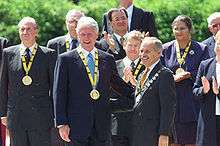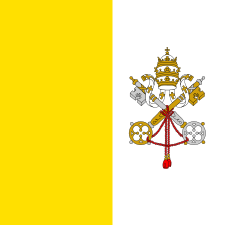Charlemagne Prize
| Charlemagne Prize | |
|---|---|
| Awarded for | Distinguished service on behalf of European unification |
| Location | Aachen, Germany |
| Presented by | Society for the Conferring of the International Charlemagne Prize of Aachen |
| First awarded | May 1, 1950 |
| Official website | www.karlspreis.de |

The Charlemagne Prize (German: Karlspreis; full name originally Internationaler Karlspreis der Stadt Aachen, International Charlemagne Prize of the City of Aachen, since 1988 Internationaler Karlspreis zu Aachen, International Charlemagne Prize of Aachen) is one of the most prestigious European prizes. It has been awarded annually since 1950 by the German city of Aachen to people who contributed to the ideals upon which it has been founded. It commemorates Charlemagne, ruler of the Frankish Empire and founder of what became the Holy Roman Empire, who resided and is buried at Aachen. Traditionally the award is given to the recipient on Ascension Day in a ceremony in the town hall of Aachen. In April 2008, the organisers of the Charlemagne Prize and the European Parliament jointly created a new European Charlemagne Youth Prize, which recognises contributions by young people towards the process of European integration.
History




On 19 December 1949, Kurt Pfeiffer presented to the reading group "Corona Legentium Aquensis", which he had founded, his proposals for the prize: "We have the honour of proposing annual presentation of an international prize for the most valuable contribution in the services of Western European understanding and work for the community, and in the services of humanity and world peace. This contribution may be in the field of literary, scientific, economic or political endeavour."
The sponsors of the prize, the City of Aachen, refer to Charlemagne as the "Founder of Western Culture", and assert that under his reign, the City of Aachen was once the spiritual and political centre of the whole of what is now western Europe.
The first Charlemagne Prize was awarded to Richard Count Coudenhove-Kalergi, the founder of the Pan-European Movement.
Following the presentation of the award to the Italian Prime Minister Alcide de Gasperi in 1952, the International Charlemagne Prize of the City of Aachen has repeatedly sent messages going far beyond Germany and promoting the "unity of Europe".
The award sponsors assert that the list of Charlemagne Prize winners reflects the history of the European process of unification. They continue that it has been awarded to the founding fathers of the United Europe such as de Gasperi, Schuman, Monnet and Adenauer, and to those who have embodied hope for integration such as Edward Heath, Konstantin Karamanlis, and His Majesty Juan Carlos I.
The sponsors promote that the Charlemagne Prize is not only an expression of gratitude for lasting services for the unity of Europe, but also an encouragement and an expression of hopes and expectations directed towards the future. They quote Kurt Pfeiffer: "the Charlemagne Prize reaches into the future, and at the same time it embodies an obligation - an obligation of the highest ethical value. It is directed at a voluntary union of the European peoples without constraint, so that in their newfound strength they may defend the highest earthly goods - freedom, humanity and peace - and safeguard the future of their children and children's children."
In April 2008, the organisers of the Charlemagne Prize and the European Parliament jointly created a new European Charlemagne Youth Prize, which recognises contributions by young people towards the process of European integration.
Recipients
- 1950
 Richard Nikolaus Coudenhove-Kalergi
Richard Nikolaus Coudenhove-Kalergi - 1951
 Hendrik Brugmans
Hendrik Brugmans - 1952
 Alcide de Gasperi
Alcide de Gasperi - 1953
 Jean Monnet
Jean Monnet - 1954
 Konrad Adenauer
Konrad Adenauer - 1956
 Sir Winston S. Churchill
Sir Winston S. Churchill - 1957
.svg.png) Paul Henri Spaak
Paul Henri Spaak - 1958
 Robert Schuman
Robert Schuman - 1959
 George C. Marshall
George C. Marshall - 1960
 Joseph Bech
Joseph Bech - 1961
 Walter Hallstein
Walter Hallstein - 1963
 Edward Heath
Edward Heath - 1964
 Antonio Segni
Antonio Segni - 1966
 Jens Otto Krag
Jens Otto Krag - 1967
 Joseph Luns
Joseph Luns - 1969
 European Commission
European Commission - 1970
 François Seydoux de Clausonne
François Seydoux de Clausonne - 1972
 Roy Jenkins
Roy Jenkins - 1973
 Salvador de Madariaga
Salvador de Madariaga - 1976
.svg.png) Leo Tindemans
Leo Tindemans - 1977
 Walter Scheel
Walter Scheel - 1978
 Konstantinos Karamanlis
Konstantinos Karamanlis - 1979
 Emilio Colombo
Emilio Colombo - 1981
 Simone Veil
Simone Veil - 1982
 Juan Carlos of Spain
Juan Carlos of Spain - 1984
 Karl Carstens
Karl Carstens - 1986
 The People of Luxembourg
The People of Luxembourg - 1987
 Henry Kissinger
Henry Kissinger - 1988
 Helmut Kohl and
Helmut Kohl and  François Mitterrand
François Mitterrand - 1989
 Frère Roger
Frère Roger - 1990
 Gyula Horn
Gyula Horn - 1991
 Václav Havel
Václav Havel - 1992
 Jacques Delors
Jacques Delors - 1993
 Felipe González
Felipe González - 1994
 Gro Harlem Brundtland
Gro Harlem Brundtland - 1995
 Franz Vranitzky
Franz Vranitzky - 1996
 Beatrix of the Netherlands
Beatrix of the Netherlands - 1997
 Roman Herzog
Roman Herzog - 1998
 Bronisław Geremek
Bronisław Geremek - 1999
 Tony Blair
Tony Blair - 2000
 Bill Clinton
Bill Clinton - 2001
 György Konrád
György Konrád - 2002
 The Euro
The Euro - 2003
 Valéry Giscard d'Estaing
Valéry Giscard d'Estaing - 2004
 Pat Cox
Pat Cox - 2004
 /
/  Pope St. John Paul II (extraordinary prize)
Pope St. John Paul II (extraordinary prize) - 2005
 Carlo Azeglio Ciampi
Carlo Azeglio Ciampi - 2006
 Jean-Claude Juncker
Jean-Claude Juncker - 2007
 Javier Solana
Javier Solana - 2008
 Angela Merkel
Angela Merkel - 2009
 Andrea Riccardi
Andrea Riccardi - 2010
 Donald Tusk
Donald Tusk - 2011
 Jean-Claude Trichet
Jean-Claude Trichet - 2012
 Wolfgang Schäuble
Wolfgang Schäuble - 2013
 Dalia Grybauskaitė
Dalia Grybauskaitė - 2014
.svg.png) Herman Van Rompuy
Herman Van Rompuy - 2015
 Martin Schulz[1]
Martin Schulz[1] - 2016
 /
/  Pope Francis
Pope Francis

By country
-
 Germany : 9
Germany : 9 -
 France : 8
France : 8 -
 Italy : 5
Italy : 5 -
 United Kingdom,
United Kingdom,  Spain : 4
Spain : 4 -
.svg.png) Belgium,
Belgium,  United States,
United States,  Netherlands,
Netherlands,  Luxembourg : 3
Luxembourg : 3 -
 Vatican,
Vatican,  Poland,
Poland,  Hungary,
Hungary,  Austria : 2
Austria : 2 -
 Ireland,
Ireland,  Czech Republic,
Czech Republic,  Norway,
Norway,  Lithuania,
Lithuania,  Denmark,
Denmark,  Greece,
Greece,  Switzerland : 1
Switzerland : 1
(The Popes are only counted for Vatican)
See also
- European Charlemagne Youth Prize
- European integration
- Leipzig Human Rights Award, originally called the "Alternative Charlemagne Award", formed in opposition to Clinton's recognition with the award
References
- ↑ "President of the European Parliament to receive the 2015 Charlemagne Prize". Deutsche Welle. 2014-12-13. Archived from the original on 2014-12-13. Retrieved 2014-12-15.
External links
| Wikimedia Commons has media related to Charlemagne Prize. |
- "The International Charlemagne Prize of Aachen". Stiftung Internationaler Karlspreis zu Aachen. Retrieved 2014-12-15.
- "Charlemagne Prize". The Lord Mayor of the City of Aachen. Retrieved 2014-12-15.
- "European Charlemagne Youth Prize". European Parliament. Retrieved 2014-12-15.